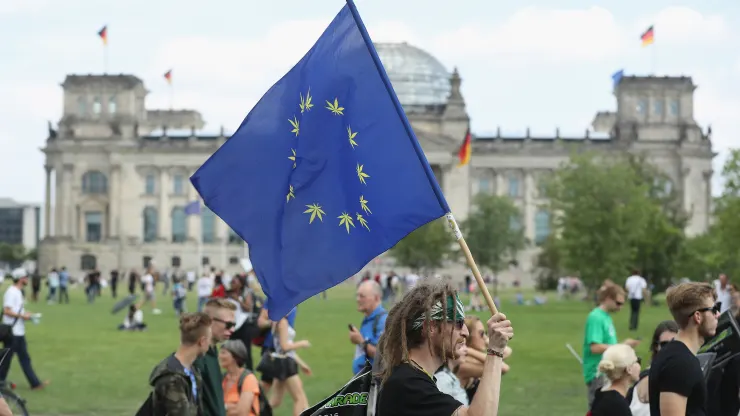News
These European Countries are Pushing to Legalize Cannabis: The EU’s Stance and Challenges

Introduction
In recent years, cannabis legalization has gained significant traction globally. While some countries have taken bold steps toward legalization, others remain hesitant to embrace the change.
Several European countries are pushing for the legalization of cannabis, despite the European Union’s reservations.
This article explores the current status of cannabis legalization in Europe, the reasons behind the push for legalization, the challenges faced, and the EU’s stance on the matter.
Current Status of Cannabis Legalization in Europe
Cannabis laws vary widely across European countries. Some nations have adopted more progressive approaches, while others maintain strict prohibitions.
For instance, countries like the Netherlands, Spain, Portugal, and Luxembourg have implemented frameworks that decriminalize or regulate marijuana to some extent.
On the other hand, the EU has not endorsed or supported the legalization of cannabis at the supranational level, leaving individual member states to determine their policies.
Reasons for Pushing Cannabis Legalization
The push for marijuana legalization in European countries stems from various factors, including economic benefits, social and public health considerations, and medical use and patient access.
Economic Benefits
Legalizing cannabis can have a significant impact on a country’s economy. It opens up opportunities for tax revenue, job creation, and tourism. By regulating and taxing the cannabis market, countries can generate substantial income that can be reinvested in public services, infrastructure, or education.
Social and Public Health Considerations
Proponents of marijuana legalization argue that regulating the market can help mitigate the negative consequences of the illicit drug trade.
It allows for quality control, product safety standards, and age restrictions, reducing the risks associated with consumption. Moreover, it frees up law enforcement resources, enabling authorities to focus on more pressing matters.
Medical Use and Patient Access
The medicinal properties of marijuana have been widely recognized, and patients suffering from various conditions often seek its therapeutic benefits.
Legalization can provide a framework for medical cannabis programs, ensuring safe and regulated access for needy patients. It also fosters research and development, leading to advancements in cannabis-based medicines.
Challenges and Opposition to Cannabis Legalization
Despite the growing support for cannabis legalization, several challenges and opposition persist.
International Drug Control Treaties
One of the primary obstacles to marijuana legalization is the existing international drug control treaties. Many European countries sign these treaties, which impose obligations to restrict marijuana use and trade.
However, some argue that these treaties must be revisited to adapt to evolving societal attitudes and scientific understanding.
Concerns about Public Health and Safety
Opponents of cannabis legalization express concerns about potential public health and safety risks associated with increased availability and use of the drug.
They argue that cannabis use can lead to negative health effects, particularly among vulnerable populations such as adolescents. They also raise concerns about impaired driving and the potential for addiction or dependency.
Lack of Consensus within the European Union
One of the reasons the European Union has not embraced marijuana legalization is the lack of consensus among member states. Each country has its unique perspective and approach to drug policy, making it challenging to reach a unified stance.
Some countries favor more lenient regulations, while others maintain a strict prohibitionist approach. This lack of consensus hinders the EU from formulating a coherent policy on marijuana legalization.
The Role of Cannabis Tourism
Cannabis tourism has emerged as a significant factor influencing the push for legalization in some European countries.
Countries like the Netherlands and Spain, known for their more relaxed marijuana policies, have seen an influx of tourists seeking to experience marijuana culture.
Legalization can help regulate this industry, ensuring that it operates safely and responsibly while capitalizing on the economic benefits of marijuana tourism and boosting local economies.
The Potential Impact on Neighboring Countries
Countries considering marijuana legalization must also consider the potential impact on neighboring nations.
Concerns include cross-border drug trafficking, disparities in drug policies leading to legal inconsistencies, and the strain on law enforcement agencies tasked with monitoring the borders.
Collaboration and coordination among neighboring countries are crucial to address these potential challenges.
Case Studies of Countries Pushing for Cannabis Legalization
Several European countries have taken notable steps toward marijuana legalization, providing valuable case studies.
The Netherlands
The Netherlands is often cited as a pioneer in cannabis policy. While cannabis remains technically illegal, the country has implemented a tolerance system, allowing the sale and consumption of cannabis in designated coffee shops. This pragmatic approach has contributed to the Netherlands’ reputation as a cannabis-friendly destination.
Spain
Spain has adopted a decentralized approach to cannabis regulation, granting autonomy to regional governments to develop their policies.
Consequently, various regions in Spain have established cannabis social clubs where members can cultivate and consume marijuana in a private, non-commercial setting.
Portugal
Portugal stands out for its progressive drug policy, decriminalizing drug possession for personal use. While marijuana remains technically illegal, its possession and use are considered an administrative offense rather than a criminal one. This approach has redirected resources toward public health and harm reduction strategies.
Luxembourg
Luxembourg made headlines in 2018 when it announced plans to become the first European country to fully legalize cannabis.
The government aims to establish a regulated market, allowing the production, distribution, and sale of cannabis for recreational use.
The legislation is being developed, and other countries will closely monitor Luxembourg’s approach.
Lessons from Countries with Legalized Cannabis
Countries with legalized cannabis offer valuable lessons for others considering similar policies.
These lessons include the importance of comprehensive regulatory frameworks, public education and awareness campaigns, robust taxation systems, and continuous evaluation and adaptation based on emerging evidence and data.
The EU’s Stance on Cannabis Legalization
The European Union does not have a unified stance on marijuana legalization. The decision to legalize cannabis remains within the jurisdiction of individual member states.
The EU primarily supports scientific research, fosters cooperation, and promotes information exchange among member states.
Conclusion
The push for cannabis legalization in Europe continues to gain momentum, with several countries advocating for change. The economic benefits, social considerations, and medical use drive this movement.
However, challenges such as international drug control treaties, public health concerns, and the lack of consensus within the European Union pose significant obstacles.
By closely examining countries’ experiences that have already legalized marijuana and fostering dialogue and cooperation among member states, European countries can navigate the complexities of marijuana legalization.
FAQs
-
Is marijuana fully legalized in any European country?
No, marijuana is not fully legalized in any European country. While some countries have adopted more lenient policies, such as decriminalization or regulation for specific purposes, full legalization remains rare.
-
What are the economic benefits of marijuana legalization?
marijuana legalization can generate significant economic benefits, including tax revenue, job creation, and tourism opportunities. It provides an avenue for legal businesses to thrive and contributes to the overall economy.
-
What are the concerns about marijuana legalization?
Concerns about marijuana legalization include potential negative health effects, risks to public safety, and challenges in enforcing regulations. There are also concerns about the potential for increased marijuana use among vulnerable populations.
-
Does the European Union support marijuana legalization?
The European Union does not have a unified stance on marijuana legalization. The decision to legalize marijuana falls within the jurisdiction of individual member states, while the EU focuses on supporting research and facilitating cooperation among countries.
Related CTN News:
































